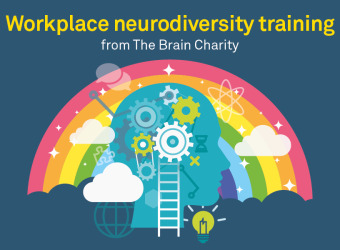
The Brain Charity partners with Zoopla to release first ever home-buying guide for neurodivergent people
New guide aims to simplify the process for neurodivergent buyers as two-thirds abandon their dream homes due to overwhelming complexity
New research released by Zoopla has revealed that two-thirds of neurodivergent homeowners (64 per cent) have previously given up on buying a home.
Seven in 10 (69 per cent) of people surveyed said the process of buying a house was harder for neurodivergent people, with ‘being overwhelmed’, ‘making big decisions’ and ‘sensory overload’ all highlighted.
The Brain Charity has teamed up with Zoopla to release the UK’s first home-buying guide adapted specifically for neurodivergent people.
Our expert neurodiversity trainers also worked with Zoopla to create a guide for estate agents to help them understand the challenges neurodivergent clients may face.
- Half of those surveyed said this was because they found the process too complex.
- A fifth asked someone else purchase a property on their behalf, amongst those who did it themselves, just a third were able to do so without assistance.
- Just 12 per cent of estate agents have been offered training or guidance on working with neurodivergent buyers or sellers.
Buying a home a challenge for neurodivergent adults
Neurodivergent adults account for an estimated 15-20 per cent of the UK population and include those who are autistic, have ADHD and dyslexia. While having a neurodivergent brain can bring many benefits, for some, the home-buying process can be challenging.
Seven in ten neurodivergent homeowners (69 per cent) believe that the homebuying process is more difficult for neurodivergent people, with issues relating to being overwhelmed by too many choices (50 per cent), arranging a mortgage (48 per cent), and having phone conversations (39 per cent) amongst those highlighted.

Jane Cullen, Training Manager at The Brain Charity, said:
“We are delighted to be working on Zoopla to launch the first home-buying guide adapted for those who are neurodivergent.
“We know huge numbers of people look to Zoopla for advice and guidance on the homebuying process so large organisations such as Zoopla must adapt key materials for those who are neurodivergent.
“It’s a big step forward, and we hope more companies, in the home-buying sector and beyond, follow suit.”
Top 10 challenges neurodivergent homebuyers face
| Top reasons neurodivergent homeowners find it harder to buy a home | Percentage |
|---|---|
| Being overwhelmed by all the properties | 50 per cent |
| Arranging a mortgage | 48 per cent |
| Conveyancing and legal aspects | 44 per cent |
| Having to make big decisions | 43 per cent |
| Knowing where to start | 39 per cent |
| Having phone conversations | 39 per cent |
| Sensory overload during viewings | 39 per cent |
| Liaising with estate agents | 37 per cent |
| Having to deal with the change in surroundings when you move | 34 per cent |
| Saving for a deposit | 31 per cent |
Twenty per cent found that they needed someone else to complete the home-buying process on their behalf. Amongst those who did it themselves, just 37 per cent were able to do everything without assistance.
Despite the additional challenges they can face, half of those surveyed (51 per cent) said that their estate agent was not aware that they were neurodivergent.
Meanwhile, a quarter (25 per cent) had proactively mentioned it, whilst another quarter (24 per cent) were asked by their estate agent.
Vital guidance for estate agents on supporting neurodivergent home buyers
Additional research conducted amongst estate agents suggests that just under half (48 per cent) are aware of having sold a home to or for anyone who is neurodivergent.
This is likely because just six per cent currently ask buyers and sellers if they are neurodivergent as a matter of course. The main reason they do not ask (38 per cent) is because they are worried it could be seen as discrimination.
Encouragingly, when estate agents are aware, an understanding of the need to make adjustments is present. Of those who have neurodivergent clients, 88 per cent said they regularly make adaptations for them.

However, the need for more support on the subject is clear, as just 12 per cent of estate agents say they have been offered training or guidance on working with neurodivergent buyers or sellers.
Furthermore, 29 per cent of neurodivergent homebuyers said that the homebuying information they received was not neurodivergent-friendly.
To address this, Zoopla and The Brain Charity have also created a guide for estate agents, to help them understand the specific barriers and additional needs neurodivergent homebuyers may have.
The guide, which will be issued to estate agents by Zoopla, includes information on the adaptations they may want to make.
Daniel Copley, Consumer Expert at Zoopla, said:
“The home buying process is complicated enough for those who are not neurodivergent, let alone for those who are.
“The standout finding is that most neurodivergent homeowners have previously tried to buy a home and given up. With over half saying this is because they found the process too complex, it shows there is a pressing need to adapt the guidance for neurodivergent people.
“While it is not a magic bullet, we have made the important first step with our guides for neurodivergent home buyers and estate agents.”
The essential guides for neurodivergent house buyers
Your simplified steps to home ownership:
Category: News
Published: 10 December 2024














